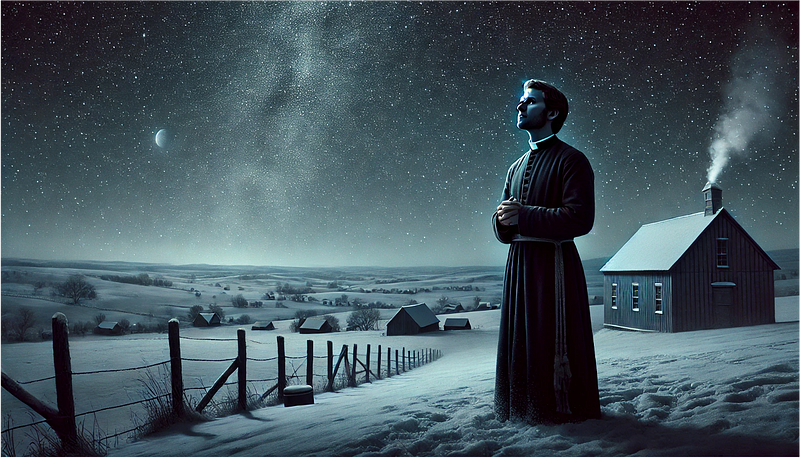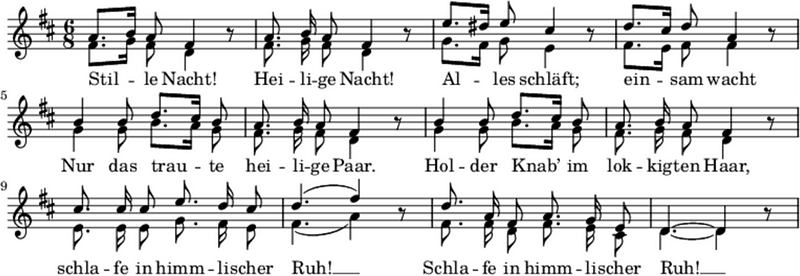Why Your Obstacles Might Be Your Greatest Gift
Dec 18, 2024
By the end of 1816, Europe was still in shambles.
The meteoric rise and fall of Napoleon Bonaparte had caught all of Europe off-guard. For decades, war engulfed the continent, and untold numbers suffered. When his conquest was finally stopped once and for all at Waterloo in 1815, everyone (except France) sighed in relief as Napoleon was shipped off to Saint Helena in the South Atlantic for good.
All told, its estimated that between 3.5–6.5 million people (comprising both civilians and soldiers) died during these harsh times, which was about 3.5% of the entire population of Europe. Today, that percentage would have equaled about 26 million deaths. Add on top the financial insecurity caused by “The Little Ice Age” which had been ruining crops? In 1816 life was pretty rough.
What to do?
People got to work, they made the best with what they had, and began to rebuild. In particular, one Catholic priest in Austria wrote a poem that captured the feelings he felt in this moment. In the face of so much confusion and difficulty all around him, he sought heavenly help. And looking to the sky, he found it. As he gazed, the stillness and wide expanse of the heavens calmed his heart and made him think to a time in his bible where “Heavenly hosts [sang] Alleluia!”
Despite all the uncertainty, upheaval, and despair, he found hope, and wrote it down.

(Photo: Joseph Mohr searching the sky)
But then, life moved on and he put his poem away. What use is a little poem anyway?
Soon after the priest was transferred to a new village which was next to a river. There, 2 years later, the priest found himself yet again facing uncertainty, upheaval, and despair when in 1818 the river flooded, destroying much of the village and their church. As the waters receded, the priest and villagers tried to salvage what they could. However the one thing that was damaged beyond repair? The beloved church organ.
With no organ, there could be no music. And with Christmas quickly coming the villagers needed something to look forward to.
What to do?
The priest got to work, made the best with what he had, and started planning the Christmas service. It was then he remembered his poem. Would that poem, he wondered, written during another time of difficulty and upheaval… could it bring hope in these devastating circumstances as well? It might, he thought, but he needed help setting it to music. He reached out to a friend who was a local school teacher as well as a gifted musician.
The priest shared his poem and the teacher set it to music… the story goes… in an afternoon.
Finally, the night of the Christmas service came. With the organ broken, the musician suggested the song be played with a guitar instead. However since guitars weren’t approved for official church services, the song would have to be sung AFTER the service ended at midnight. What’s more, the audience would have to quickly learn it and sing along because, well, the Priest and Teacher needed all the help they could get.

(Photo: The original melody and text in German)
And so on Christmas Eve in 1818, Father Joseph Mohr the Priest, and Franz Gruber the musician, sang…
… a song where the text came from witnessing the worst destruction and atrocities of war in living memory…
…a song where the music was hurriedly composed during a time of uncertainty and upheaval caused by natural disasters…
…a song with an instrument that was banned because the organ had been destroyed…
… a song for a church and village gutted and recovering from a devastating flood.
And that’s how the beloved hymn “Silent Night” came to be. What does this have to do with success and influence?
“Not the most promising of starts…” many would say. Or is it?
· If Father Joseph Mohr lived in a time of ease and no worries, would he have been pushed to seek hope and peace from the star filled heavens for his poem?
· If his village had been perfectly intact with no problems at all, would he have worked so hard to create a special Christmas service for his community?
· If the organ had been in fine form with no issues, would Franz Gruber have written such a simple and elegant melody that people could easily learn and sing to?
From the outset, these obstacles may have seemed like great impediments. But in hindsight? These obstacles of war, upheaval, and disaster went from impediments to ingredients that shaped one of the most enduring songs in the entire world. All because people got to work, and made the best with what they had.

(Photo: Paving through our own mountain sized obstacles is hard, but the most rewarding)
Most of the time we endeavor to prevent or avoid obstacles. I know I do. And yet, just as in the story of Silent Night, most would agree that for all their challenges, overcoming obstacles are the making of us. In their fires are forged the best things we cherish in life and in ourselves.
· What if your present challenges are the doorway to your success?
· What if your current obstacles are really nudging you to a more meaningful path?
· What if- for all their difficulties- your struggles are shaping you into a more kind, compassionate, and influential person who will leave a mark in the lives of others?
This holiday season, may we take a moment to reflect on what we have learned from the year, what we have overcome, and more importantly, who we want to yet become. Then let’s get to work, and make the best with what we have. Only then will we discover that we truly have everything.
Perseverance shines brightest in the face of adversity, and hope shines brightest in the face of despair.
Just like those stars on that silent, holy, night.
Christian
CHRISTIAN HANSEN has gone behind the scenes in some of the biggest organizations in the world to find out the reasons why some people get chosen and why others don’t. As the #1 bestselling and LinkedIn Top Ten ranked author of “The Influence Mindset: The Art & Science of Getting People to Choose You” Christian helps teams and organizations who want to stand out and be the obvious choice. With degrees from Brigham Young University and The London School of Economics, he’s helped thousands of individuals position and sell themselves. A fan of international communication, history, and choral music, he currently lives in Utah with his wife. Reach him at: TheChristianHansen.com
Its Like Getting a 1-1 Coaching Session
Delivered to Your Inbox.
Join our mailing list to receive weekly Influence Insights that will make you the obvious choice to Decision Makers.
Don't worry, your information will not be shared.
We hate SPAM. We will never sell your information, for any reason.


